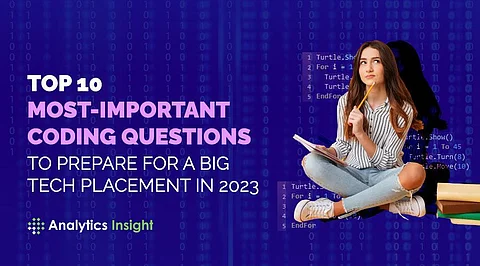

Securing a job at a big tech company is every programmer's dream, be it because of the amazing work culture, the pay package they offer, or the professional growth they offer, it's worth being a part of the FAANG ecosystem. Nonetheless, cracking interviews at big tech companies is not a cakewalk, even for experienced ones. Imagine, what freshers would go through if they do not have the right orientation toward the nature of nerve-cracking programming language interviews. Coding and programming have become some of the most popular tech careers, making huge strides among tech aspirants. But to acquire positions in top companies like Amazon, Microsoft, IBM, Google, and others, these aspirants must be aware of essential algorithms, and methods and should have a good hold over programming languages such as Java, especially if they are applying for programming jobs. On that note, this article lists the top 10 most-important coding questions to prepare for a big tech placement in 2023.
A data structure is a storage format that defines how data is stored, organized, and manipulated.
Some popular data structures are Arrays, Trees, and Graphs.
What is an Array?
An array is commonly referred to as a collection of items stored at contiguous memory locations.
Items stored are of the same type.
It organizes data so that a related set of values can be quickly sorted or searched.
array string
Like an array, a linked list refers to a linear data structure in which the elements are not necessarily stored in a contiguous manner.
It is basically a sequence of nodes, each node points towards the next node forming a chain-like structure.
linked list
LIFO is an abbreviation for Last In First Out
It is a way of accessing, storing, and retrieving data.
It extracts the data that was stored last first.
A stack refers to a linear data structure performing operations in a LIFO (Last In First Out) order.
In a stack, elements can only be accessed, starting from the topmost to the bottom part.
R is used in data visualization as it has several inbuilt functions and libraries that help in data visualizations. These libraries include ggplot2, leaflet, lattice, and others. R helps in exploratory data analysis as well as feature engineering. Also, customizing graphs is easier in R than in Python.
The main advantage of using window functions over regular aggregate functions is that window functions do not cause rows to become grouped into a single output row. The row can retain its separate identities and, an aggregate value will be added to each row.
In Python, data types are used to classify and categorize data. The different in-built data types are Number, String, Tuple, Range, List, Set, and Dictionary.
A decision tree algorithm is a popular supervised machine learning algorithm, which is mainly used for regression and classification. It allows breaking down a dataset into smaller subsets. A decision tree algorithm can handle both categorical and numerical data.
Eigenvectors are for understanding linear transformations. data scientists have to calculate the eigenvectors for a covariance matrix or a correlation. Whereas, eigenvalues are the directions to use linear transformation acts by compressing, flipping, or stretching.
Join our WhatsApp Channel to get the latest news, exclusives and videos on WhatsApp
_____________
Disclaimer: Analytics Insight does not provide financial advice or guidance on cryptocurrencies and stocks. Also note that the cryptocurrencies mentioned/listed on the website could potentially be scams, i.e. designed to induce you to invest financial resources that may be lost forever and not be recoverable once investments are made. This article is provided for informational purposes and does not constitute investment advice. You are responsible for conducting your own research (DYOR) before making any investments. Read more about the financial risks involved here.
